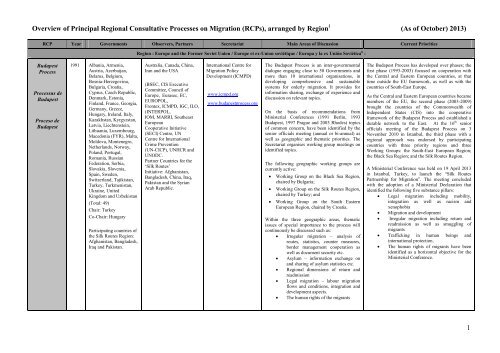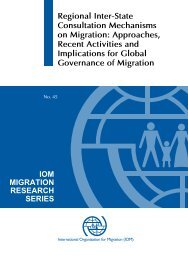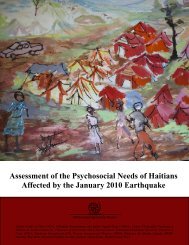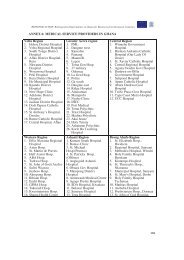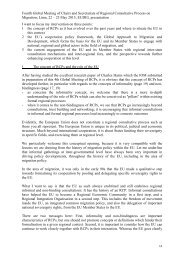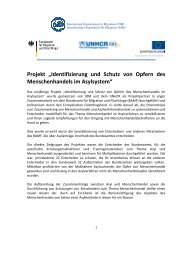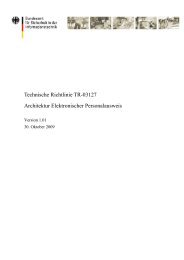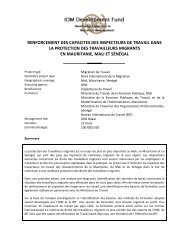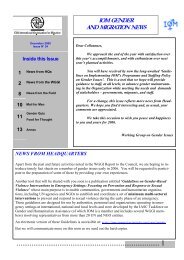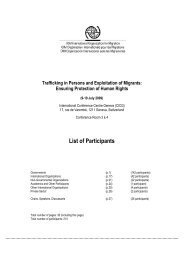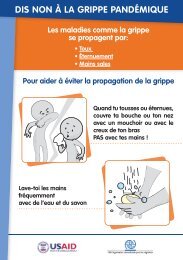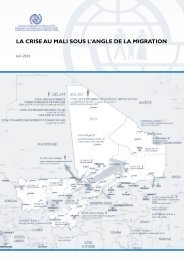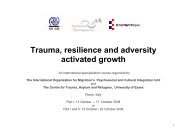Overview of Principal RCPs - International Organization for Migration
Overview of Principal RCPs - International Organization for Migration
Overview of Principal RCPs - International Organization for Migration
You also want an ePaper? Increase the reach of your titles
YUMPU automatically turns print PDFs into web optimized ePapers that Google loves.
<strong>Overview</strong> <strong>of</strong> <strong>Principal</strong> Regional Consultative Processes on <strong>Migration</strong> (<strong>RCPs</strong>), arranged by Region i (As <strong>of</strong> October) 2013)<br />
RCP Year Governments Observers, Partners Secretariat Main Areas <strong>of</strong> Discussion Current Priorities<br />
Region : Europe and the Former Soviet Union / Europe et ex-Union soviétique / Europa y la ex Unión Soviética ii :<br />
Budapest<br />
Process<br />
Processus de<br />
Budapest<br />
Proceso de<br />
Budapest<br />
1991 Albania, Armenia,<br />
Austria, Azerbaijan,<br />
Belarus, Belgium,<br />
Bosnia-Herzegovina,<br />
Bulgaria, Croatia,<br />
Cyprus, Czech Republic,<br />
Denmark, Estonia,<br />
Finland, France, Georgia,<br />
Germany, Greece,<br />
Hungary, Ireland, Italy,<br />
Kazakhstan, Kyrgyzstan,<br />
Latvia, Liechtenstein,<br />
Lithuania, Luxembourg,<br />
Macedonia (FYR), Malta,<br />
Moldova, Montenegro,<br />
Netherlands, Norway,<br />
Poland, Portugal,<br />
Romania, Russian<br />
Federation, Serbia,<br />
Slovakia, Slovenia,<br />
Spain, Sweden,<br />
Switzerland, Tajikistan,<br />
Turkey, Turkmenistan,<br />
Ukraine, United<br />
Kingdom and Uzbekistan<br />
(Total: 49)<br />
Chair: Turkey<br />
Co-Chair: Hungary<br />
Participating countries <strong>of</strong><br />
the Silk Routes Region:<br />
Afghanistan, Bangladesh,<br />
Iraq and Pakistan.<br />
Australia, Canada, China,<br />
Iran and the USA<br />
(BSEC, CIS Executive<br />
Committee, Council <strong>of</strong><br />
Europe, Eurasec, EC,<br />
EUROPOL,<br />
Frontex, ICMPD, IGC, ILO,<br />
(INTERPOL,<br />
IOM, MARRI, Southeast<br />
European<br />
Cooperative Initiative<br />
(SECI) Centre, UN<br />
Centre <strong>for</strong> <strong>International</strong><br />
Crime Prevention<br />
(UN-CICP), UNHCR and<br />
UNODC.<br />
Partner Countries <strong>for</strong> the<br />
‘Silk Routes’<br />
Initiative: Afghanistan,<br />
Bangladesh, China, Iraq,<br />
Pakistan and the Syrian<br />
Arab Republic.<br />
<strong>International</strong> Centre <strong>for</strong><br />
<strong>Migration</strong> Policy<br />
Development (ICMPD)<br />
www.icmpd.org<br />
www.budapestprocess.org<br />
The Budapest Process is an inter-governmental<br />
dialogue engaging close to 50 Governments and<br />
more than 10 international organisations, in<br />
developing comprehensive and sustainable<br />
systems <strong>for</strong> orderly migration. It provides <strong>for</strong><br />
in<strong>for</strong>mation sharing, exchange <strong>of</strong> experience and<br />
discussion on relevant topics.<br />
On the basis <strong>of</strong> recommendations from<br />
Ministerial Conferences (1991 Berlin, 1993<br />
Budapest, 1997 Prague and 2003 Rhodes) topics<br />
<strong>of</strong> common concern, have been identified by the<br />
senior <strong>of</strong>ficials meeting (annual or bi-annual) as<br />
well as geographic and thematic priorities. The<br />
Secretariat organises working group meetings on<br />
identified topics.<br />
The following geographic working groups are<br />
currently active:<br />
<br />
<br />
<br />
Working Group on the Black Sea Region,<br />
chaired by Bulgaria;<br />
Working Group on the Silk Routes Region,<br />
chaired by Turkey; and<br />
Working Group on the South Eastern<br />
European Region, chaired by Croatia.<br />
Within the three geographic areas, thematic<br />
issues <strong>of</strong> special importance to the process will<br />
continuously be discussed such as:<br />
Irregular migration – analysis <strong>of</strong><br />
routes, statistics, counter measures,<br />
border management cooperation as<br />
well as document security etc.<br />
Asylum – in<strong>for</strong>mation exchange on<br />
and sharing <strong>of</strong> asylum statistics etc.<br />
Regional dimensions <strong>of</strong> return and<br />
readmission<br />
Legal migration – labour migration<br />
flows and conditions, integration and<br />
development aspects.<br />
The human rights <strong>of</strong> the migrants<br />
The Budapest Process has developed over phases; the<br />
first phase (1993-2003) focused on cooperation with<br />
the Central and Eastern European countries, at that<br />
time outside the EU framework, as well as with the<br />
countries <strong>of</strong> South-East Europe.<br />
As the Central and Eastern European countries became<br />
members <strong>of</strong> the EU, the second phase (2003-2009)<br />
brought the countries <strong>of</strong> the Commonwealth <strong>of</strong><br />
Independent States (CIS) into the cooperative<br />
framework <strong>of</strong> the Budapest Process and established a<br />
durable network to the East. At the 16 th senior<br />
<strong>of</strong>ficials meeting <strong>of</strong> the Budapest Process on 3<br />
November 2010 in Istanbul, the third phase with a<br />
regional approach was endorsed by participating<br />
countries with three priority regions and three<br />
Working Groups: the South-East European Region;<br />
the Black Sea Region; and the Silk Routes Region.<br />
A Ministerial Conference was held on 19 April 2013<br />
in Istanbul, Turkey, to launch the “Silk Routes<br />
Partnership <strong>for</strong> <strong>Migration</strong>”. The meeting concluded<br />
with the adoption <strong>of</strong> a Ministerial Declaration that<br />
identified the following five substance pillars:<br />
Legal migration including mobility,<br />
integration as well as racism and<br />
xenophobia<br />
<strong>Migration</strong> and development<br />
Irregular migration including return and<br />
readmission as well as smuggling <strong>of</strong><br />
migrants<br />
Trafficking in human beings and<br />
international protection.<br />
The human rights <strong>of</strong> migrants have been<br />
identified as a horizontal objective <strong>for</strong> the<br />
Ministerial Conference.<br />
1
RCP Year Governments Observers, Partners Secretariat Main Areas <strong>of</strong> Discussion Current Priorities<br />
Prague<br />
Process<br />
Processus de<br />
Prague<br />
Proceso de<br />
Praga<br />
2009<br />
Albania, Armenia,<br />
Austria, Azerbaijan,<br />
Belarus, Belgium, Bosnia<br />
and Herzegovina,<br />
Bulgaria, Croatia,<br />
Cyprus, Czech Republic,<br />
Denmark,<br />
Estonia, Finland, France,<br />
Georgia, Germany,<br />
Greece, Hungary, Ireland,<br />
Italy, Kazakhstan,<br />
Kosovo/UNSCR<br />
1244, Kyrgyzstan, Latvia,<br />
Liechtenstein, Lithuania,<br />
Luxembourg, the <strong>for</strong>mer<br />
Yugoslav Republic <strong>of</strong><br />
Macedonia, Malta,<br />
Moldova, Montenegro,<br />
the Netherlands,<br />
Norway, Poland,<br />
Portugal, Romania,<br />
Russian Federation,<br />
Serbia, Slovakia,<br />
Slovenia, Spain, Sweden,<br />
Switzerland,<br />
Tajikistan, Turkey,<br />
Turkmenistan, Ukraine,<br />
United Kingdom and<br />
Uzbekistan. The<br />
European Commission.<br />
None currently.<br />
Secretariat is termed<br />
‘Project Support Unit’ and<br />
is run by ICMPD.<br />
www.icmpd.org<br />
http://www.pragueprocess.<br />
eu<br />
The objectives <strong>of</strong> the Prague Process are to<br />
generally strengthen cooperation in migration<br />
management, and specifically to explore and<br />
develop agreed-upon principles and elements <strong>for</strong><br />
close migration partnerships between the<br />
participating countries.<br />
The Process was initiated under the Czech presidency<br />
<strong>of</strong> the EU through the endorsement <strong>of</strong> the ‘Building<br />
<strong>Migration</strong> Partnerships’ joint declaration and supports<br />
the Global Approach to <strong>Migration</strong> and Mobility<br />
(GAMM) <strong>of</strong> the EU. It proceeds through Action Plans<br />
endorsed through regular Ministerial Conferences and<br />
annual Senior Officials Meetings and focuses on the<br />
following issues:<br />
<br />
<br />
<br />
<br />
Asylum<br />
Legal migration<br />
Irregular migration<br />
<strong>Migration</strong> and development.<br />
The Prague Process Action Plan (2012-2016)<br />
identified the following priorities:<br />
Prevent and fight illegal migration<br />
Promote readmission, voluntary return and<br />
sustainable reintegration<br />
Address legal migration and mobility<br />
(special focus: labour migration)<br />
Promote the integration <strong>of</strong> legally residing<br />
migrants in their host societies<br />
<strong>Migration</strong> and development<br />
Strengthen capacities in the area <strong>of</strong> asylum<br />
and international protection<br />
(Total: 50)<br />
2
RCP Year Governments Observers, Partners Secretariat Main Areas <strong>of</strong> Discussion Current Priorities<br />
Region: Americas and Caribbean / Amériques et Caraïbes / América y el Caribe:<br />
Puebla<br />
Process<br />
(Regional<br />
Conference on<br />
<strong>Migration</strong><br />
(RCM))<br />
Processus de<br />
Puebla<br />
(Conférence<br />
régionale sur<br />
les migrations<br />
(CRM))<br />
Proceso de<br />
Puebla<br />
(Conferencia<br />
Regional sobre<br />
Migración<br />
(CRM))<br />
1996 Belize, Canada, Costa<br />
Rica, Dominican<br />
Republic, El Salvador,<br />
Guatemala, Honduras,<br />
Mexico, Nicaragua,<br />
Panama and the USA<br />
(Total: 11)<br />
Current Presidency Pro-<br />
Tempore: Government <strong>of</strong><br />
Costa Rica<br />
Argentina, Colombia,<br />
Ecuador, Jamaica and Peru.<br />
Economic Commission <strong>for</strong><br />
Latin America and the<br />
Caribbean (ECLAC), IOM,<br />
UNHCR, Central American<br />
Integration System (SICA),<br />
Inter-American Commission<br />
<strong>for</strong> Human Rights (ICHR),<br />
Ibero-American General<br />
Secretariat (SEGIB),<br />
UNHCR, United Nations<br />
Population Fund (UNFPA)<br />
and the UN Special<br />
Rapporteur on the Human<br />
Rights <strong>of</strong> Migrants.<br />
The Regional Network <strong>for</strong><br />
Civil <strong>Organization</strong>s on<br />
<strong>Migration</strong> (RNCOM) is a<br />
coalition <strong>of</strong> civil society<br />
organizations (CSOs) from<br />
all 11 RCM Member States.<br />
It is neither a member <strong>of</strong> nor<br />
an observer to the RCM but<br />
participates in many aspects<br />
<strong>of</strong> the RCM including<br />
seminars, workshops, and<br />
conferences.<br />
Technical Secretariat (TS)<br />
IOM provides the TS with<br />
technical cooperation and<br />
administrative support.<br />
http://www.rcmvs.org/<br />
The three main areas <strong>of</strong> discussion are migration<br />
policy and management; human rights <strong>of</strong><br />
migrants; migration and development.<br />
The current priorities <strong>of</strong> the Puebla Process include the<br />
following:<br />
<br />
<br />
<br />
<br />
Study the possibility <strong>of</strong> establishing links with<br />
other cooperation processes in the area <strong>of</strong><br />
migration and development;<br />
Formulate social development policies linked to<br />
migration processes;<br />
Enhance border cooperation;<br />
Promote better understanding <strong>of</strong> the regional<br />
migration phenomenon through a long-term<br />
comprehensive approach;<br />
Develop guidelines <strong>for</strong> the return <strong>of</strong><br />
unaccompanied migrant minors;<br />
<br />
<br />
<br />
Promote migration and health activities;<br />
Strengthen respect <strong>for</strong> the human rights <strong>of</strong><br />
migrants regardless <strong>of</strong> status with special<br />
attention to vulnerable groups such as women<br />
and children;<br />
Ensure international protection <strong>of</strong> refugees;<br />
Enhance cooperation in the return and<br />
reintegration <strong>of</strong> repatriated migrants;<br />
Promote cooperation to combat migrant<br />
smuggling and trafficking in persons;<br />
<br />
<br />
<br />
Share best practices in the facilitation <strong>of</strong><br />
remittance flows;<br />
Undertake activities in the area <strong>of</strong> "Integration<br />
and Insertion <strong>of</strong> Migrants".<br />
Redress the challenges presented by extracontinental<br />
and regional migration movements<br />
3
RCP Year Governments Observers, Partners Secretariat Main Areas <strong>of</strong> Discussion Current Priorities<br />
SACM<br />
(South<br />
American<br />
Conference on<br />
<strong>Migration</strong>)<br />
SACM<br />
(Conférence<br />
sud-américaine<br />
sur les<br />
migrations)<br />
CSM<br />
(Conferencia<br />
Sudamericana<br />
sobre<br />
Migraciones)<br />
2001 Argentina, Bolivia,<br />
Brazil, Chile, Colombia,<br />
Ecuador, Guyana,<br />
Paraguay, Peru, Surinam,<br />
Uruguay and Venezuela<br />
(Total: 12)<br />
Current Presidency Pro-<br />
Tempore: Government <strong>of</strong><br />
Colombia<br />
Australia, Canada, France,<br />
Italy, Mexico, Spain,<br />
Switzerland and the USA<br />
Andean Community <strong>of</strong><br />
Nations (CAN), ECLAC,<br />
ILO, IOM, Latin American<br />
Economic System, United<br />
Nations Educational,<br />
Scientific and Cultural<br />
<strong>Organization</strong> (UNESCO),<br />
UNHCR, groups affiliated<br />
with the Catholic Church or<br />
defending human rights.<br />
Technical Secretariat (TS)<br />
IOM provides the TS with<br />
technical cooperation and<br />
administrative support.<br />
http://csm-osumi.org<br />
SACM’s themes include: rights <strong>of</strong> migrants;<br />
integration; migration and development;<br />
diasporas; in<strong>for</strong>mation exchange; migration<br />
statistics; human trafficking; and migrant<br />
smuggling.<br />
Depending on the needs, technical preparatory<br />
meetings take place two or three months be<strong>for</strong>e<br />
the annual Conference.<br />
The current priorities <strong>of</strong> SACM include the following:<br />
<br />
<br />
<br />
<br />
Ensure respect <strong>for</strong> the human rights <strong>of</strong> migrants<br />
regardless <strong>of</strong> their status (rejection <strong>of</strong> the<br />
criminalization <strong>of</strong> irregular status);<br />
Promote discourse on migration in relation to<br />
development;<br />
Strengthen dialogue and political coordination<br />
among States;<br />
Highlight the value <strong>of</strong> contributions made by<br />
migrants to development in countries <strong>of</strong><br />
destination;<br />
Highlight the significance <strong>of</strong> migrants’<br />
contributions to the welfare and cultural<br />
enrichment <strong>of</strong> societies in countries <strong>of</strong> origin;<br />
<br />
<br />
Promote the participation <strong>of</strong> representatives from<br />
civil society in the <strong>for</strong>mulation, implementation<br />
and evaluation <strong>of</strong> programmes on migration<br />
matters.<br />
Elaboration <strong>of</strong> an assessment <strong>of</strong> South-South<br />
cooperation mechanisms in Member States <strong>of</strong><br />
SACM;<br />
Prepare <strong>for</strong> and contribute to the HLD 2013;<br />
<br />
Discussion on incorporation <strong>of</strong> SACM into<br />
UNASUR, in order to establish a “South<br />
American citizenship” in the long term;<br />
In 2013, the SACM’s Member States approved the<br />
Declaration <strong>of</strong> Buenos Aires which contains, inter<br />
alia, the following key points:<br />
<br />
<br />
<br />
<br />
<br />
<br />
Strong disappointment <strong>of</strong> SACM’s MS on the<br />
GFMD as they consider that the contributions <strong>of</strong><br />
the South American countries were not taken in<br />
account in the GFMD;<br />
The debate on international migration should<br />
take place within the UN;<br />
SACM members encourage to debate about the<br />
convenience to approve a binding <strong>International</strong><br />
Convention on <strong>Migration</strong>;<br />
SACM’ MS recommend <strong>for</strong> the GMG to adjust<br />
its objectives;<br />
Commitment <strong>of</strong> SACM members to protect the<br />
human rights <strong>of</strong> all migrants, independently <strong>of</strong><br />
the migratory situation <strong>of</strong> the persons;<br />
The SACM requests the inclusion <strong>of</strong> migration<br />
in the Development Agenda post-2015.<br />
4
RCP Year Governments Observers, Partners Secretariat Main Areas <strong>of</strong> Discussion Current Priorities<br />
Region: Western Mediterranean / Méditerranée occidentale / Mediterráneo Occidental<br />
5 + 5<br />
Dialogue<br />
(Regional<br />
Ministerial<br />
Conference on<br />
<strong>Migration</strong> in<br />
the Western<br />
Mediterranean)<br />
Dialogue 5+5<br />
(Conférence<br />
ministérielle<br />
régionale sur la<br />
migration en<br />
Europe<br />
occidentale)<br />
2002 Algeria, France, Italy,<br />
Libya, Malta, Mauritania,<br />
Morocco, Portugal, Spain<br />
and Tunisia<br />
(Total: 10)<br />
Current President: Malta<br />
IOM, ILO and ICMPD<br />
No <strong>of</strong>ficial secretariat<br />
In the past, IOM has<br />
provided technical<br />
cooperation and logistical<br />
support whenever<br />
requested by the relevant<br />
Presidency.<br />
In<strong>for</strong>mal dialogues are held on an ad hoc basis in<br />
which governments cooperate and exchange<br />
in<strong>for</strong>mation and analysis on topics such as<br />
migration trends; irregular migration and<br />
trafficking in human beings; migration and codevelopment;<br />
the role <strong>of</strong> diasporas; migrants’<br />
rights and obligations; integration; movement <strong>of</strong><br />
people and regular migration flow management;<br />
labour migration and vocational training;<br />
migration and health; local cooperation; and<br />
gender equality in the context <strong>of</strong> migration.<br />
The 2008 Evora Conference held in Portugal<br />
highlighted the:<br />
<br />
<br />
<br />
<br />
Importance <strong>of</strong> as well as need <strong>of</strong> establishing a<br />
coherent and complementary strategy on<br />
migration with other regional and international<br />
<strong>for</strong>a;<br />
Need to facilitate and create channels <strong>for</strong> regular<br />
migration <strong>for</strong> labour purposes;<br />
The importance <strong>of</strong> measures <strong>for</strong> enhancing the<br />
impact <strong>of</strong> migration on development in the<br />
countries <strong>of</strong> origin;<br />
Need to establish integration models grounded<br />
on the principles <strong>of</strong> promoting and respecting<br />
fundamental human rights.<br />
Pursuant to the recommendations adopted at the Evora<br />
Conference, Portugal and Tunisia jointly organized an<br />
expert workshop on circular migration held in Tunis in<br />
February 2009.<br />
Diálogo 5 + 5<br />
(Conferencia<br />
Ministerial del<br />
Mediterráneo<br />
Occidental<br />
sobre<br />
Migración)<br />
The Second Summit <strong>of</strong> the Heads <strong>of</strong> State and<br />
Government <strong>of</strong> the Member States <strong>of</strong> the 5+5<br />
Dialogue took place in Valletta, 5-6 October, 2012. It<br />
concluded with the Malta Declaration highlighting the<br />
need to enhance the process <strong>of</strong> integration between the<br />
Arab Maghreb Union and the European Union and<br />
calling <strong>for</strong> a global and shared approach to migration<br />
as an effective development tool.<br />
5
RCP Year Governments Observers, Partners Secretariat Main Areas <strong>of</strong> Discussion Current Priorities<br />
MTM<br />
(Mediterranean<br />
Transit<br />
<strong>Migration</strong><br />
Dialogue)<br />
MTM<br />
(Dialogue sur la<br />
migration de<br />
transit en<br />
Méditerranée)<br />
MTM<br />
(Diálogo sobre<br />
las Migraciones<br />
de Tránsito en<br />
el<br />
Mediterráneo)<br />
2003 Algeria, Cape Verde,<br />
Egypt, Ethiopia, EU 27<br />
Member States, Ghana,<br />
Kenya, Lebanon, Libya,<br />
Mali, Morocco, Niger,<br />
Nigeria, Norway,<br />
Senegal, Switzerland,<br />
Syria, Tunisia and Turkey<br />
(Total: 45 MTM Partner<br />
States)<br />
Chairing depends on the<br />
activities carried out.<br />
The MTM Dialogue is<br />
currently in its fourth phase,<br />
entitled “A Dialogue in<br />
Action”.<br />
Most <strong>of</strong> the MTM activities<br />
are implemented in<br />
consortium with relevant<br />
international actors.<br />
The current MTM Partner<br />
Agencies are: Caritas,<br />
Europol, Frontex, IFAD,<br />
Interpol, IOM, UNHCR, and<br />
UNODC.<br />
Invited Observers are<br />
Australia, Community <strong>of</strong><br />
Sahel and Saharan States<br />
(CEN-SAD), DCAF,<br />
Eurojust, General Secretariat<br />
<strong>of</strong> the European Council,<br />
IGC, IOM, <strong>International</strong><br />
<strong>Organization</strong> <strong>for</strong> Peace,<br />
Care and Relief (IOPCR),<br />
League <strong>of</strong> Arab States,<br />
MARRI, <strong>Organization</strong> <strong>for</strong><br />
Security and Co-operation in<br />
Europe (OSCE) and United<br />
Nations Economic and<br />
Social Commission <strong>for</strong><br />
Western Asia (UNESCWA).<br />
<strong>International</strong> Centre <strong>for</strong><br />
<strong>Migration</strong> Policy<br />
Development (ICMPD)<br />
www.icmpd.org<br />
The objectives <strong>of</strong> the MTM are as follows:<br />
Implement capacity-building and<br />
operational projects encompassing a<br />
dialogue component to facilitate the<br />
dissemination <strong>of</strong> results at the regional level<br />
and provide a solid plat<strong>for</strong>m to discuss<br />
exchange.<br />
<br />
<br />
<br />
<br />
Elaborate recommendations, and agree on<br />
future steps and build up spin-<strong>of</strong>f initiatives.<br />
Address the issues related to irregular and<br />
mixed migration (irregular migration/<br />
human smuggling; trafficking in human<br />
beings; asylum and protection; and return<br />
and readmission).<br />
Address medium- and long-term issues<br />
related to migration and development (the<br />
mapping <strong>of</strong> institutional frameworks;<br />
capacities and practices <strong>of</strong> countries <strong>of</strong><br />
origin and destination in the field <strong>of</strong><br />
migration and development; and<br />
strengthening African and Middle Eastern<br />
Diaspora policies <strong>for</strong> more development,<br />
notably through South-South and South-<br />
North exchange).<br />
Promote cooperation on labour and circular<br />
migration.<br />
The MTM development has been articulated<br />
around four phases:<br />
2002-2003: Exploratory Phase;<br />
2004-2005: Consolidation Phase;<br />
2006-2008: Project Phase;<br />
2009-ongoing: A Dialogue In Action;<br />
Since 2009, the MTM Secretariat implements the<br />
program Linking Emigrant Communities <strong>for</strong> more<br />
development. The first phase 2009-2010 focused on<br />
the mapping <strong>of</strong> the various frameworks and initiatives<br />
within which countries <strong>of</strong> origin operate to build-up<br />
relations with their diasporas and to facilitate their role<br />
as potential agents <strong>of</strong> development. This phase,<br />
implemented in partnership with IOM resulted in the<br />
publication <strong>of</strong> the Inventory <strong>of</strong> National Institutional<br />
Capacities and Practices.<br />
The second phase <strong>of</strong> this program was launched mid-<br />
September 2011 under the title Strengthening African<br />
and Middle Eastern Diaspora Policies through South-<br />
South Exchange (AMEDIP). It has included National<br />
Consultations in all the targeted countries <strong>of</strong> origin<br />
and a South-South Expert Exchange Mechanism. The<br />
dialogue component has been carried out in the <strong>for</strong>m<br />
<strong>of</strong> thematic workshops and expert meetings where the<br />
results <strong>of</strong> these state-to-state exchanges will be shared<br />
and discussed. This project will run until 2014.<br />
The MTM Secretariat also implements the project<br />
Interactive Map on <strong>Migration</strong> (i-Map) www.imapmigration.org<br />
which serves as a plat<strong>for</strong>m <strong>for</strong> exchange<br />
<strong>of</strong> in<strong>for</strong>mation and portal to access in<strong>for</strong>mation in the<br />
field <strong>of</strong> irregular and mixed migration and migration<br />
and development.<br />
In parallel to the i-Map, the MTM Secretariat<br />
implements in partnership with the authorities <strong>of</strong><br />
France, Italy, the Netherlands and the United Kingdom<br />
the project MTM i-Map In<strong>for</strong>mal ILO Network. The<br />
project aims, in partnership with countries <strong>of</strong><br />
destination Immigration Liaison Officers posted in<br />
countries <strong>of</strong> origin or transit, to support coordination<br />
among the local ILOs and cooperation with relevant<br />
national authorities <strong>of</strong> the country where the ILOs are<br />
posted. Both the i-Map and i-Map In<strong>for</strong>mal ILO<br />
Network projects will run until 2014.<br />
Initially focusing on transit migration, the MTM<br />
has extended its scope over the years to cover the<br />
various aspects <strong>of</strong> irregular and mixed migration,<br />
as well as migration and development.<br />
The MTM Secretariat and MTM Partner States<br />
have also actively participated in other<br />
frameworks and sought cross-fertilization with<br />
other migration <strong>for</strong>ums, notably with the 5+5<br />
Dialogue, the Rabat Process, the African-EU<br />
MME Partnership, and the EuroMed.<br />
6
RCP Year Governments Observers, Partners Secretariat Main Areas <strong>of</strong> Discussion Current Priorities<br />
Region: Africa / Afrique / África<br />
MIDWA<br />
(<strong>Migration</strong><br />
Dialogue <strong>for</strong><br />
West Africa)<br />
MIDWA<br />
(Dialogue sur la<br />
migration pour<br />
l’Afrique de<br />
l’Ouest)<br />
MIDWA<br />
(Diálogo sobre<br />
la Migración<br />
para África<br />
Occidental)<br />
2001 Benin, Burkina Faso,<br />
Cape Verde, Côte<br />
d’Ivoire, Ghana, Gambia,<br />
Guinea, Guinea-Bissau,<br />
Liberia, Mali, Niger,<br />
Nigeria, Senegal, Sierra<br />
Leone and Togo<br />
(Total: 15)<br />
Chair: Coincides with<br />
respective chairmanship<br />
<strong>of</strong> ECOWAS.<br />
France and Switzerland.<br />
Conseil des Organisations<br />
Non Gouvernementales<br />
d’Appui au Développement<br />
(CONGAD), ECOWAS,<br />
Institut de Recherche pour le<br />
Développement (IRD), ILO,<br />
IOM, United Nations Office<br />
<strong>for</strong> the Coordination <strong>of</strong><br />
Humanitarian Affairs<br />
(OCHA), Organisation <strong>of</strong><br />
African Unity (OAU),<br />
OECD, West African<br />
Economic and Monetary<br />
Union (UEMOA),<br />
UNAIDS, UNHCR,<br />
UNICEF, UNODC, and<br />
World Food Programme<br />
(WFP)<br />
No <strong>of</strong>ficial secretariat<br />
Based on the<br />
Memorandum <strong>of</strong><br />
Understanding between<br />
IOM and ECOWAS signed<br />
in July 2002, IOM<br />
provides support to<br />
capacity-building activities<br />
targeting both ECOWAS<br />
institutions and Member<br />
States.<br />
In December 2000, in cooperation with IOM, the<br />
ECOWAS inaugurated a regional consultative<br />
process with the major aim <strong>of</strong> accelerating the<br />
regional integration process and addressing<br />
problematic migration issues in regional <strong>for</strong>a. The<br />
MIDWA process was specifically designed to<br />
encourage the ECOWAS Member States to<br />
discuss common migration issues and concerns in<br />
a regional context <strong>for</strong> which immediate solutions<br />
may not be <strong>for</strong>thcoming on a national level.<br />
MIDWA addresses five key areas as follows:<br />
<br />
<br />
<br />
<br />
Promotion <strong>of</strong> peace and stability in West<br />
Africa and protection <strong>of</strong> migrants’ rights<br />
Contribution <strong>of</strong> men and women migrants<br />
to the development <strong>of</strong> their country <strong>of</strong><br />
origin<br />
Alleviating poverty in emigration areas<br />
In<strong>for</strong>mation, sensitization and research into<br />
the different aspects <strong>of</strong> West African<br />
international migration<br />
Intra-regional and inter-regional cooperation.<br />
On January 18, 2008 ECOWAS adopted a Common<br />
Approach on <strong>Migration</strong>, which should serve as the<br />
general framework <strong>for</strong> MIDWA initiatives. It<br />
identifies six key areas:<br />
<br />
<br />
<br />
<br />
<br />
<br />
Free movement <strong>of</strong> persons within the ECOWAS<br />
zone<br />
Management <strong>of</strong> regular migration;<br />
Combating human trafficking;<br />
Harmonizing policies;<br />
Protection <strong>of</strong> the rights <strong>of</strong> migrants, asylum<br />
seekers and refugees; and<br />
Recognizing the gender dimension <strong>of</strong> migration.<br />
ECOWAS Department <strong>of</strong> Free Movement is currently<br />
coordinating the implementation <strong>of</strong> the ECOWAS<br />
Common Approach on <strong>Migration</strong>.<br />
The most recent meeting <strong>of</strong> MIDWA, in July 2012,<br />
focused on internal organizational and governance<br />
matters, including deliberations on an enhanced<br />
institutional framework <strong>for</strong> MIDWA.<br />
7
RCP Year Governments Observers, Partners Secretariat Main Areas <strong>of</strong> Discussion Current Priorities<br />
MIDSA<br />
(<strong>Migration</strong><br />
Dialogue <strong>for</strong><br />
Southern<br />
Africa)<br />
MIDSA<br />
(Dialogue sur la<br />
migration pour<br />
l’Afrique<br />
australe)<br />
MIDSA<br />
(Diálogo sobre<br />
la Migración en<br />
el África<br />
Meridional)<br />
2000 Angola, Botswana,<br />
Comoros, Democratic<br />
Republic <strong>of</strong> the Congo,<br />
Lesotho, Madagascar,<br />
Malawi, Mauritius,<br />
Mozambique, Namibia,<br />
Seychelles, South Africa,<br />
Swaziland, Tanzania,<br />
Zambia and Zimbabwe.<br />
(Total: 16 members + 9<br />
observer countries)<br />
Current MIDSA Chair:<br />
SADC Chair -<br />
Mozambique<br />
Australia, Canada,<br />
Denmark, the Netherlands,<br />
Norway, Sweden,<br />
Switzerland, the United<br />
Kingdom and the United<br />
States <strong>of</strong> America (USA)<br />
have participated in past<br />
MIDSA meetings as<br />
observer countries.<br />
Observer institutions that<br />
have also been involved in<br />
past MIDSA meetings<br />
include the Southern African<br />
Development Community<br />
(SADC) Secretariat, SADC<br />
Parliamentary Forum,<br />
NEPAD, the African Union<br />
(AU) Commission, the<br />
Southern African <strong>Migration</strong><br />
Project and relevant UN<br />
agencies such as UNHCR,<br />
UNDP (depending on the<br />
themes <strong>of</strong> the workshop).<br />
Relevant academics,<br />
humanitarian NGOs, legal<br />
advocacy groups, faithbased<br />
organizations and<br />
regional associations are<br />
invited to its workshops on<br />
an ad-hoc basis.<br />
No <strong>of</strong>ficial secretariat<br />
IOM provides technical<br />
and administrative support.<br />
www.migrationdialogue.or<br />
g/<br />
MIDSA focuses on 7 main themes:<br />
<br />
<br />
<br />
<br />
<br />
<br />
<br />
Irregular migration;<br />
<strong>Migration</strong> and development;<br />
<strong>Migration</strong> and health;<br />
Capacity building in migration<br />
management;<br />
Forced migration;<br />
Labour migration; and<br />
<strong>Migration</strong> policies, legislation and data<br />
collection.<br />
The current priorities <strong>of</strong> MIDSA are to:<br />
<br />
Assist SADC governments to respond to the AU<br />
Strategic Framework on <strong>Migration</strong> and AU<br />
Common Position on <strong>Migration</strong> and<br />
Development;<br />
Stimulate discussion and debate on the<br />
implications <strong>of</strong> ratifying the SADC Draft<br />
Protocol on the Facilitation <strong>of</strong> Movement; and<br />
<br />
Assist governments to participate in global<br />
debates about migration and development e.g.<br />
Global Commission on <strong>International</strong> <strong>Migration</strong><br />
(GCIM); UN High Level Dialogue on<br />
<strong>International</strong> <strong>Migration</strong> and Development; and<br />
Global Forum on <strong>Migration</strong> and Development<br />
(GFMD).<br />
The first MIDSA ministerial conference ‘Managing<br />
<strong>Migration</strong> through Regional Cooperation’ took place<br />
in November 2010. Recommendations generated from<br />
the meeting included agreements on strengthening<br />
coordination among SADC States on managing<br />
migration, encouraging the ratification <strong>of</strong> the Protocol<br />
<strong>for</strong> the facilitation <strong>of</strong> free movements <strong>of</strong> persons in<br />
SADC countries, promoting labour mobility, raising<br />
public awareness regarding the risks <strong>of</strong> irregular<br />
migration and engaging diasporas in national<br />
development strategies.<br />
The 2012 MIDSA Technical Meeting in Mauritius<br />
covered topics such as the creation <strong>of</strong> legal<br />
frameworks and policies on regional cooperation and<br />
challenges in managing labour migration in the SADC<br />
region.<br />
The second MIDSA ministerial conference<br />
“Enhancing Labour <strong>Migration</strong> and <strong>Migration</strong><br />
Management in the SADC Region” in July 2013<br />
confirmed the key points <strong>of</strong> the first MIDSA<br />
ministerial conference. Additionally, MIDSA<br />
ministers recommended a SADC-wide migration<br />
pr<strong>of</strong>ile study, the establishment <strong>of</strong> migration focal<br />
points in relevant ministries, inter-regional<br />
cooperation with <strong>RCPs</strong> as <strong>for</strong> example EAC and<br />
COMESA, improved access to health care <strong>for</strong><br />
migrants and the ratification <strong>of</strong> global migration<br />
conventions such as the ILO Convention on Health<br />
and Safety.<br />
8
RCP Year Governments Observers, Partners Secretariat Main Areas <strong>of</strong> Discussion Current Priorities<br />
IGAD-RCP<br />
(Intergovernmental<br />
Authority on<br />
Development -<br />
Regional<br />
Consultative<br />
Process on<br />
<strong>Migration</strong>)<br />
IGAD-RCP<br />
(Processus<br />
consultatif<br />
régional de<br />
l’Autorité<br />
intergouvernem<br />
en-tale pour le<br />
développement<br />
pour la<br />
migration)<br />
RCP IGAD<br />
(Proceso<br />
Consultivo<br />
Regional sobre<br />
Migración<br />
IGAD<br />
(Autoridad<br />
Intergubernam<br />
ental para el<br />
Desarrollo))<br />
2008 Djibouti, Ethiopia,<br />
Kenya, Somalia, Sudan<br />
and Uganda (i.e. IGAD<br />
Member States)<br />
(Total: 6)<br />
(Eritrea temporarily<br />
suspended its<br />
membership)<br />
African Union (AU)<br />
Commission, IOM and the<br />
members <strong>of</strong> the IGAD<br />
Partners Forum (Austria,<br />
Belgium, Canada, Denmark,<br />
France, Greece, Germany,<br />
Ireland, Italy, Japan,<br />
Netherlands, Norway,<br />
Sweden, UK, USA, EC,<br />
United Nations<br />
Development Programme<br />
(UNDP) and the World<br />
Bank), and other partners,<br />
notably:<br />
Transit countries: Chad,<br />
Egypt, Libya, Niger,<br />
Tunisia and Yemen<br />
Other Regional Economic<br />
Communities (RECs)<br />
including ECOWAS,<br />
EAC, SADC, ECCAS,<br />
CENSAD<br />
Relevant NGOs, UN<br />
Agencies and IGOs on ad<br />
hoc basis (depending on<br />
the themes <strong>of</strong> the<br />
Consultations)<br />
IGAD Secretariat in<br />
collaboration with the AU<br />
Commission and IOM.<br />
IGAD-RCP aims to facilitate dialogue and<br />
regional co-operation in migration management<br />
amongst IGAD Member States by:<br />
<br />
<br />
Fostering greater understanding and policy<br />
coherence in migration;<br />
Strengthening regional institutional and<br />
technical capacities to implement the<br />
<strong>Migration</strong> Policy Framework <strong>for</strong> Africa;<br />
and<br />
Improving inter-state and intra-regional<br />
cooperation on migration management<br />
among countries <strong>of</strong> origin, transit and<br />
destination.<br />
14 priority areas identified by experts which the<br />
IGAD-RCP will be responsible <strong>for</strong> are as follows:<br />
<br />
<br />
<br />
<br />
<strong>Migration</strong> and development<br />
Labour migration<br />
Social integration <strong>of</strong> migrants, <br />
Protection <strong>of</strong> migrants’ rights,<br />
Smuggling and trafficking in persons,<br />
<strong>Migration</strong> data and research,<br />
<strong>Migration</strong> and health,<br />
<strong>Migration</strong> and trade,<br />
<br />
<br />
<br />
<br />
<br />
<br />
<strong>Migration</strong> and environment,<br />
<strong>Migration</strong> and security,<br />
Voluntary return <strong>of</strong> migrants,<br />
Mixed migratory flows and protection <strong>of</strong><br />
refugees,<br />
Movement <strong>of</strong> pastoralist communities, and<br />
Brain drain and unethical recruitment.<br />
In addition to the establishment <strong>of</strong> mechanisms <strong>for</strong><br />
continuous dialogue and co-operation among IGAD<br />
Member States on migration and related issues, the<br />
identified priority areas include:<br />
<br />
Technical cooperation and capacity building;<br />
In<strong>for</strong>mation collection, dissemination and<br />
sharing;<br />
<br />
<br />
<br />
<br />
<br />
<br />
Enhance dialogue and cooperation between the<br />
IGAD Member States and countries <strong>of</strong> other<br />
regions; and<br />
Progress toward <strong>for</strong>mulation and harmonization<br />
at the national and IGAD level <strong>of</strong> legislation,<br />
policies and practices in the following areas:<br />
Legal/labour migration management;<br />
Irregular migration, trafficking and smuggling,<br />
Border management; and<br />
<strong>Migration</strong> and development matters, including<br />
engagement with the Diaspora and improving<br />
and costing effective mechanisms <strong>for</strong><br />
remittances.<br />
9
RCP Year Governments Observers, Partners Secretariat Main Areas <strong>of</strong> Discussion Current Priorities<br />
Region: Asia and Oceania / Asie et Océanie / Asia y Oceanía<br />
Colombo<br />
Process<br />
(Ministerial<br />
Consultation on<br />
Overseas<br />
Employment<br />
and<br />
Contractual<br />
Labour <strong>for</strong><br />
Countries <strong>of</strong><br />
Origin in Asia)<br />
Processus de<br />
Colombo<br />
(Consultation<br />
ministérielle<br />
sur l’emploi<br />
outremer et la<br />
main-d’œuvre<br />
contractuelle<br />
pour les pays<br />
d’origine en<br />
Asie)<br />
Proceso de<br />
Colombo<br />
(Consultas<br />
ministeriales<br />
sobre empleo<br />
en ultramar y<br />
mano de obra<br />
para trabajos<br />
por contrata<br />
para países de<br />
origen en Asia)<br />
2003 Afghanistan, Bangladesh,<br />
China, India, Indonesia,<br />
Nepal, Pakistan, the<br />
Philippines, Sri Lanka,<br />
Thailand and Viet Nam,<br />
(Total: 11)<br />
Current Chair: Sri Lanka<br />
The 2003 Ministerial<br />
Consultations had no<br />
observers. In 2004, the only<br />
observer was Afghanistan<br />
(which subsequently<br />
<strong>of</strong>ficially joined the<br />
grouping in 2005).<br />
In 2005, the following<br />
countries were invited as<br />
observers: Bahrain, Italy,<br />
Kuwait, Malaysia, Qatar,<br />
Republic <strong>of</strong> Korea, Saudi<br />
Arabia and the United Arab<br />
Emirates.<br />
Several organizations were<br />
also invited as observers:<br />
Asian Development Bank<br />
(ADB); Association <strong>of</strong><br />
Southeast Asian Nations<br />
(ASEAN); Department <strong>for</strong><br />
<strong>International</strong> Development<br />
UK (DFID); EC; Gulf<br />
Cooperation Council<br />
(GCC); ILO; United Nations<br />
Development Fund <strong>for</strong><br />
Women (UNIFEM) and the<br />
World Bank.<br />
In 2011 the following<br />
countries were invited as<br />
observers:<br />
Australia, South Korea, Italy<br />
Switzerland, USA,<br />
Several organizations were<br />
also invited as observers:<br />
UN Aids, UN DP, EC, ILO<br />
UAE, IRCR, UN Women<br />
IOM provides technical<br />
support to the process<br />
since its inception in 2003<br />
and serves as its<br />
Secretariat.<br />
www.colomboprocess.org<br />
The Colombo Process has three thematic foci:<br />
<br />
<br />
<br />
Protection <strong>of</strong> and Provision <strong>of</strong> Services to<br />
Overseas Temporary Contractual Workers. In<br />
particular, protecting these workers from<br />
abusive practices in recruitment and<br />
employment, and providing them appropriate<br />
services in terms <strong>of</strong> pre-departure in<strong>for</strong>mation<br />
and orientation and welfare provisions;<br />
Optimizing Benefits <strong>of</strong> Organized Labour<br />
Mobility. This includes the development <strong>of</strong><br />
new overseas employment markets,<br />
increasing remittance flows through <strong>for</strong>mal<br />
channels and enhancing the development<br />
impact <strong>of</strong> remittances; and<br />
Capacity Building, Data Collection and Inter-<br />
State Cooperation. This includes institutional<br />
capacity building and in<strong>for</strong>mation exchange<br />
to meet labour mobility challenges; increasing<br />
cooperation with destination countries in the<br />
protection <strong>of</strong> overseas temporary contractual<br />
workers and access to labour markets; and<br />
enhancing cooperation among countries <strong>of</strong><br />
origin.<br />
The Colombo Process has had Ministerial<br />
Consultations in 2003, 2004, 2005 and 2011.<br />
The Ministerial Consultations in Bali in 2005 set <strong>for</strong>th<br />
action-oriented recommendations relating to the<br />
welfare <strong>of</strong> overseas workers and support services.<br />
Recommendations were also made to optimize the<br />
benefits <strong>of</strong> organized overseas employment and<br />
cooperation on managed labour mobility between<br />
countries <strong>of</strong> origin and destination. Pursuant to these<br />
recommendations and with funding from the European<br />
Commission’s AENEAS programme, the Colombo<br />
Process has undertaken activities in working with<br />
governments and private institutions to enhance<br />
national capacity and to establish linkages among<br />
countries to better facilitate legal labour mobility; the<br />
dissemination <strong>of</strong> in<strong>for</strong>mation to potential overseas<br />
temporary contractual workers regarding legal labour<br />
opportunities and procedures and the risks <strong>of</strong> irregular<br />
mobility in order to ensure that these potential workers<br />
make in<strong>for</strong>med decisions; and in fostering regional<br />
cooperation ef<strong>for</strong>ts among major Asian labour source<br />
countries and with major countries <strong>of</strong> destination in<br />
promoting legal labour mobility channels and<br />
opportunities and thus reducing irregular movements.<br />
The Fourth Colombo Process Ministerial<br />
Consultations were held in Dhaka, Bangladesh from<br />
19-21 April 2011 under the theme <strong>Migration</strong> with<br />
Dignity. The meeting resulted in the adoption <strong>of</strong> a<br />
Dhaka Declaration as well as Operating Modalities <strong>for</strong><br />
the Colombo Process. An IOM study on Labour<br />
<strong>Migration</strong> from Colombo Process Countries: Good<br />
Practices, Challenges and Ways Forward was also<br />
discussed and endorsed at the Ministerial Meeting.<br />
10
RCP Year Governments Observers, Partners Secretariat Main Areas <strong>of</strong> Discussion Current Priorities<br />
Abu Dhabi<br />
Dialogue<br />
(Ministerial<br />
Consultations<br />
on Overseas<br />
Employment<br />
and<br />
Contractual<br />
Labour <strong>for</strong><br />
Countries <strong>of</strong><br />
Origin and<br />
Destination in<br />
Asia)<br />
Dialogue<br />
d’Abou Dhabi<br />
(Consultation<br />
ministérielle<br />
sur l’emploi<br />
outremer et la<br />
main-d’œuvre<br />
contractuelle<br />
intéressant les<br />
pays d’origine<br />
et de<br />
destination en<br />
Asie)<br />
Diálogo de<br />
Abu Dhabi<br />
(Consultas<br />
ministeriales<br />
sobre empleo<br />
en ultramar y<br />
mano de obra<br />
para trabajos<br />
por contrata<br />
para países de<br />
origen y destino<br />
en Asia)<br />
2008 11 Colombo Process<br />
countries (Afghanistan,<br />
Bangladesh, China, India,<br />
Indonesia, Nepal,<br />
Pakistan, the Philippines,<br />
Sri Lanka, Thailand and<br />
Viet Nam)<br />
9 Asian destination<br />
countries (Bahrain,<br />
Kuwait, Malaysia, Oman,<br />
Qatar, Saudi Arabia,<br />
Singapore, United Arab<br />
Emirates and Yemen)<br />
(Total: 20)<br />
Current Chair:<br />
Philippines<br />
France, Germany, Japan,<br />
US, Mauritius, Republic <strong>of</strong><br />
Korea, Poland and EC<br />
IOs (including IOM) and<br />
CSOs are invited to<br />
participate in ADD meetings<br />
as observers and thematic<br />
experts.<br />
A support structure in Abu<br />
Dhabi (under deliberation).<br />
IOs and CSOs are invited<br />
to participate in ADD<br />
meetings as observers and<br />
thematic experts.<br />
http://www.gfmd.org/en/rc<br />
p/abu-dhabi<br />
http://www.colomboproces<br />
s.org/index.php?option=co<br />
m_content&view=article&<br />
id=46&Itemid=29<br />
The concrete output <strong>of</strong> the Abu Dhabi Dialogue<br />
is the Abu Dhabi Declaration, which defines a<br />
new collaborative approach, <strong>for</strong>ward-looking and<br />
action-oriented, to better address issues <strong>of</strong><br />
temporary contractual labour mobility and to<br />
optimize its benefits <strong>for</strong> the development <strong>of</strong> both<br />
countries <strong>of</strong> origin and destination as well as the<br />
workers themselves.<br />
Participating States have identified the following<br />
four key partnerships through which they wish to<br />
foster in<strong>for</strong>mation sharing, promote capacity<br />
building, technical cooperation and interstate<br />
cooperation:<br />
<br />
Enhancing knowledge in the areas <strong>of</strong>:<br />
labour market trends, skills pr<strong>of</strong>iles,<br />
temporary contractual workers and<br />
remittances policies and flows and their<br />
interplay with development in the region;<br />
Building capacity <strong>for</strong> effective matching <strong>of</strong><br />
labour demand and supply;<br />
Preventing illegal recruitment practices and<br />
promoting welfare and protection measures<br />
<strong>for</strong> contractual workers, supportive <strong>of</strong> their<br />
well-being and preventing their exploitation<br />
at origin and destination;<br />
Developing a framework <strong>for</strong> a<br />
comprehensive approach to managing the<br />
entire cycle <strong>of</strong> temporary contractual<br />
mobility that fosters the mutual interests <strong>of</strong><br />
countries <strong>of</strong> origin and destination.<br />
The priorities <strong>of</strong> the ADD include the following:<br />
<br />
Identification <strong>of</strong> the roles and responsibilities <strong>of</strong> all<br />
actors (governmental and private) at each stage <strong>of</strong><br />
the contractual work cycle (from recruitment to<br />
preparation to movement to work in a host country<br />
to return and reintegration) to ensure safe,<br />
protected and beneficial labour mobility.<br />
Elaboration <strong>of</strong> concrete projects activities<br />
(“practical outcomes” and related plan <strong>of</strong> action) to<br />
realize these partnerships.<br />
<br />
Elaboration <strong>of</strong> a regional multilateral framework<br />
on temporary contractual labour mobility.<br />
During the second ministerial conference which took<br />
place from 17-19 April 2012 in Manila, Philippines,<br />
Ministers by means <strong>of</strong> the Manila Communiqué<br />
adopted a Regional Collaboration Framework (RCF)<br />
intended to outline the key challenges that arise in the<br />
contract mobility cycle and to suggest concrete action<br />
to increase the benefits <strong>of</strong> international contract<br />
worker mobility. Interim Operating Modalities were<br />
adopted which <strong>for</strong>esee that the ADD secretariat is to<br />
be set up in Abu Dhabi and that the Philippines will be<br />
presiding <strong>of</strong>ficer <strong>of</strong> the ADD until the next Dialogue<br />
in 2014.<br />
11
RCP Year Governments Observers, Partners Secretariat Main Areas <strong>of</strong> Discussion Current Priorities<br />
Bali Process<br />
(Bali Process on<br />
People Smuggling,<br />
Trafficking in<br />
Persons and<br />
Related<br />
Transnational<br />
Crime)<br />
Processus de Bali<br />
(Processus de Bali<br />
sur le trafic de<br />
migrants, la traite<br />
des êtres humains<br />
et la criminalité<br />
internationale qui<br />
s’y rapporte)<br />
Proceso de Bali<br />
(Conferencia sobre<br />
el contrabando y la<br />
trata de personas y<br />
el crimen<br />
transnacional<br />
conexo)<br />
Others: Like-minded States (IGC); Thematically-organized (Bali Process) / Autres: Etats de même sensibilité (IGC); classement thématique (Processus de Bali) /<br />
Otros: Estados afines (IGC); organizado por temas (Proceso de Bali)<br />
2002 Afghanistan, Australia,<br />
Bangladesh, Bhutan, Brunei<br />
Darussalam, Cambodia,<br />
China, DPR Korea, Fiji,<br />
France (New Caledonia),<br />
Hong Kong (SAR <strong>of</strong> China),<br />
India, Indonesia, Iran (Islamic<br />
Republic <strong>of</strong>), Iraq, Japan,<br />
Jordan, Kiribati, Lao PDR,<br />
Macau (SAR <strong>of</strong> China),<br />
Malaysia, Maldives,<br />
Mongolia, Myanmar, , Nauru,<br />
Nepal, New Zealand,<br />
Pakistan, Palau, Papua New<br />
Guinea, Philippines, Republic<br />
<strong>of</strong> Korea, Samoa, Singapore,<br />
Solomon Islands, Sri Lanka,<br />
Syria, Thailand, Timor Leste,<br />
Tonga, Turkey, United Arab<br />
Emirates, United States <strong>of</strong><br />
America, Vanuatu, Vietnam.<br />
The Ad Hoc Group is made<br />
up <strong>of</strong> Afghanistan, Australia,<br />
Bangladesh, India, Indonesia,<br />
Malaysia, Maldives,<br />
Myanmar, New Zealand,<br />
Pakistan, Sri Lanka, Thailand,<br />
Viet Nam<br />
(Total: 44 Members)<br />
Co- Chairs: Australia and<br />
Indonesia<br />
Thematic coordinators:<br />
<br />
<br />
Policy Issues and Legal<br />
Frameworks: New<br />
Zealand;<br />
Policy Issues and Law<br />
En<strong>for</strong>cement: Thailand<br />
The partner and observer<br />
states are:<br />
Austria, Belgium, Canada,<br />
Denmark, Finland, Germany,<br />
Italy, The Netherlands,<br />
Norway, Poland, Romania,<br />
Russian Federation, South<br />
Africa, Spain, Sweden,<br />
Switzerland, United<br />
Kingdom<br />
The following are partner<br />
and observer institutions:<br />
The Asian Development<br />
Bank (ADB), APC<br />
Secretariat (Intergovernmental<br />
Asia-Pacific<br />
Consultations on Refugees,<br />
Displaced Persons and<br />
Migrants), ASEAN<br />
Secretariat, IGC Secretariat,<br />
<strong>International</strong> Centre <strong>for</strong><br />
<strong>Migration</strong> Policy<br />
Development, ICRC, IFRC,<br />
ILO, INTERPOL, Pacific<br />
Islands Forum Secretariat,<br />
The European Commission,<br />
The World Bank, UNDP.<br />
IOM, UNODC and UNHCR<br />
have participant status.<br />
Monitoring and<br />
implementation <strong>of</strong> related<br />
activities and initiatives <strong>of</strong><br />
the Process are guided by a<br />
steering group composed<br />
<strong>of</strong> the governments <strong>of</strong><br />
Australia, Indonesia, New<br />
Zealand, Thailand as well<br />
as IOM and UNHCR.<br />
IOM provides<br />
administrative support to<br />
the Bali Process.<br />
A Regional Support Office<br />
has been set-up in<br />
Bangkok to facilitate the<br />
implementation <strong>of</strong> the<br />
Regional Cooperation<br />
Framework (RCF).<br />
www.baliprocess.net<br />
http://www.baliprocess.net<br />
/regional-support-<strong>of</strong>fice<br />
The overarching objective <strong>of</strong> the Bali Process<br />
is to encourage and facilitate regional<br />
cooperation in addressing the transnational<br />
crimes <strong>of</strong> people smuggling and trafficking in<br />
persons, including through:<br />
Development <strong>of</strong> more effective<br />
in<strong>for</strong>mation and intelligence sharing<br />
Improved cooperation among regional<br />
law en<strong>for</strong>cement agencies to deter/<br />
combat people smuggling and trafficking<br />
networks;<br />
Enhanced cooperation on border and visa<br />
systems to detect and prevent illegal<br />
movements;<br />
Increased public awareness in order to<br />
discourage these activities and warn<br />
those susceptible;<br />
Enhanced effectiveness <strong>of</strong> return as a<br />
strategy to deter people smuggling and<br />
trafficking;<br />
Cooperation in verifying the identity and<br />
nationality <strong>of</strong> illegal migrants and<br />
trafficking victims;<br />
Enactment <strong>of</strong> national legislation to<br />
criminalize people smuggling and<br />
trafficking in persons;<br />
Provision <strong>of</strong> appropriate protection and<br />
assistance to the victims <strong>of</strong> trafficking,<br />
particularly women and children;<br />
Enhanced focus on tackling the root<br />
causes <strong>of</strong> illegal migration;<br />
Assisting countries to adopt best<br />
practices in asylum management, in<br />
accordance with the principles <strong>of</strong> the<br />
Refugee Convention; and<br />
Advancing the implementation <strong>of</strong> an<br />
inclusive non-binding regional<br />
cooperation framework under which<br />
interested parties can cooperate more<br />
effectively to reduce irregular movement<br />
through the region.<br />
The current thematic priorities remain the<br />
strengthening <strong>of</strong> regional policy and law<br />
en<strong>for</strong>cement cooperation to combat trafficking and<br />
smuggling in all its <strong>for</strong>ms, including maritime<br />
ventures, which put the lives <strong>of</strong> those being<br />
smuggled or trafficked at very considerable risk.<br />
At the Ministerial Conference in 2011, ministers<br />
endorsed a Regional Cooperation Framework (RCF)<br />
under which bilateral and sub-regional arrangements<br />
to address irregular migration could be implemented.<br />
This framework recognized that while law<br />
en<strong>for</strong>cement <strong>of</strong> border measures is important they<br />
are not enough and it is important to consider the<br />
protection and asylum aspects <strong>of</strong> irregular flows.<br />
The Ad Hoc Group's priority is to operationalize the<br />
RCF at the sub-regional level, including through the<br />
establishment <strong>of</strong> a Regional Support Office to be<br />
based in Bangkok, Thailand.<br />
The Co-Chairs <strong>of</strong> the Bali Process on People<br />
Smuggling, Trafficking in Persons and Related<br />
Transnational Crime (Bali Process) hosted the Sixth<br />
Meeting <strong>of</strong> Ad Hoc Group (AHG) Senior Officials<br />
in Bali, Indonesia, on 1 June 2012. The purpose <strong>of</strong><br />
the meeting was to take <strong>for</strong>ward implementation <strong>of</strong><br />
the Regional Cooperation Framework (RCF)<br />
through establishment <strong>of</strong> a Regional Support Office<br />
(RSO). The RSO was <strong>of</strong>ficially opened in Bangkok<br />
on 10 September 2012.<br />
The most recent Ministerial Conference was held in<br />
April 2013 in Bali, Indonesia. Ministers emphasized<br />
the strengthening ef<strong>for</strong>ts to reduce irregular<br />
movement and urged the process’s members to<br />
increase further implementation <strong>of</strong> the RCF.<br />
Ministers also agreed on the importance <strong>of</strong><br />
addressing issues <strong>of</strong> trafficking and planned to<br />
establish a working group that would be led by the<br />
Bali Process Ad Hoc Group (AHG), open to all<br />
members, on strengthening ef<strong>for</strong>ts to combat<br />
trafficking in persons <strong>of</strong> issues.<br />
12
RCP Year Governments Observers, Partners Secretariat Main Areas <strong>of</strong> Discussion Current Priorities<br />
IGC<br />
(Inter-<br />
Governmental<br />
Consultations<br />
on <strong>Migration</strong>,<br />
Asylum and<br />
Refugees)<br />
IGC<br />
(Consultations<br />
intergouvernementales<br />
sur les<br />
politiques<br />
concernant<br />
l’asile, les<br />
réfugiés et la<br />
migration)<br />
IGC<br />
(Consultas<br />
Intergubername<br />
ntales sobre<br />
Asilo,<br />
Refugiados y<br />
Políticas de<br />
Migración)<br />
1984 Australia, Belgium, Canada,<br />
Denmark, Finland, France,<br />
Germany, Greece, Ireland,<br />
Netherlands, New Zealand,<br />
Norway, Spain, Sweden,<br />
Switzerland, the UK and the<br />
USA<br />
(Total: 17)<br />
Current Chair: Denmark<br />
IOM, UNHCR and EC<br />
IGC Secretariat<br />
www.igc.ch<br />
The major focus <strong>of</strong> discussions in the IGC<br />
from 1985-1992 was asylum; from 1992 the<br />
focus shifted to en<strong>for</strong>cement: inter alia, return,<br />
smuggling, and technology.<br />
In 2001, the IGC held its first meeting on<br />
immigration and since has also focused on<br />
specific aspects <strong>of</strong> immigration and<br />
integration, including security and migration,<br />
legal and illegal migration, labour migration,<br />
and circular migration.<br />
Each Chair identifies a theme <strong>for</strong> the duration<br />
<strong>of</strong> its year-long Chair and holds a specific<br />
workshop on it; Ireland identified “Designing<br />
Effective Immigration Systems” as its theme<br />
<strong>for</strong> 2006/2007, which reflects the growing<br />
interest among IGC States in<br />
immigration/integration issues. Sweden’s<br />
theme <strong>for</strong> its Chair (2007/2008) was “Circular<br />
<strong>Migration</strong>”. The theme <strong>of</strong> the Chair<br />
Switzerland (2008/2009) was “Skilled Labour<br />
<strong>Migration</strong>: Opportunities <strong>for</strong> National and<br />
<strong>International</strong> Cooperation”. The theme <strong>of</strong> the<br />
USA (2010/2011) was “Humanitarian<br />
Responses to Crisis with <strong>Migration</strong><br />
Consequences” and the 2011/2012 theme <strong>of</strong><br />
the German Chair was “Motives <strong>for</strong><br />
<strong>Migration</strong>”.<br />
The theme <strong>for</strong> 2012/2013 is the “Role and<br />
Influence <strong>of</strong> Employers in <strong>Migration</strong>”.<br />
Since 2005, following a strategic review, IGC has three<br />
core activities:<br />
Asylum/refugees;<br />
Admission, control and en<strong>for</strong>cement and;<br />
Immigration and integration.<br />
There is a growing emphasis in IGC States on<br />
immigration and integration following a reduction in<br />
asylum numbers and the rising importance <strong>of</strong> these other<br />
topics.<br />
IGC currently has standing working groups on:<br />
<br />
<br />
<br />
<br />
Asylum/ refugees;<br />
Immigration;<br />
Integration; and<br />
Admission, control and en<strong>for</strong>cement<br />
There are crosscutting working groups on:<br />
Technology; and<br />
Country <strong>of</strong> origin in<strong>for</strong>mation.<br />
Another crosscutting working group on Data meets on an<br />
ad hoc basis, as required.<br />
At the working level, recent activities have focused inter<br />
alia on:<br />
<br />
<br />
improving procedures and quality <strong>of</strong> decisions (fair,<br />
fast, flexible, efficient, transparent),<br />
comprehensive approach to migration, including the<br />
immigration/integration nexus, the impact <strong>of</strong> the<br />
crisis on migration, and responses to mixed flows<br />
control mechanisms and use <strong>of</strong> biometric<br />
technologies<br />
specific caseloads and countries/regions (e.g.<br />
unaccompanied minors, highly-skilled migrants,<br />
Iraqis), and<br />
<br />
in<strong>for</strong>mation and data sharing.<br />
N.B. The following in<strong>for</strong>mation has been compiled and updated thanks to the assistance <strong>of</strong> the RCP secretariats where they exist and/or staff <strong>of</strong> the <strong>International</strong> <strong>Organization</strong> <strong>for</strong><br />
<strong>Migration</strong> (IOM) involved in supporting the <strong>RCPs</strong>. As an overview, by its nature it is not intended to be exhaustive. However, it would benefit from additional input and further review<br />
in order to make it more complete and accurate. Comments and suggestions are welcomed and encouraged, and should be sent to the <strong>International</strong> Partnerships Division at IOM (by<br />
e-mail to ipd@iom.int or by fax to +41 22 798 61 50), to be incorporated into future versions.<br />
13
i Two <strong>of</strong> the <strong>RCPs</strong> covered in this matrix are not organized geographically and appear at the end <strong>of</strong> this matrix. Although not included in this matrix, other regional groups on migration exist, <strong>of</strong> various types. Examples include the<br />
Cluster Process, the MARRI (<strong>Migration</strong>, Asylum, Refugees Regional Initiative) Regional Forum, the Central American Commission <strong>of</strong> <strong>Migration</strong> Directors - Comisión Centroamericana de Directores de Migración (OCAM), the<br />
Pacific Immigration Directors Conference (PIDC) and the Joint Consultations on <strong>Migration</strong> (JCMs). This matrix is based on a matrix prepared by the <strong>International</strong> <strong>Organization</strong> <strong>for</strong> <strong>Migration</strong> (IOM) and the Global Commission <strong>for</strong><br />
<strong>International</strong> <strong>Migration</strong> (GCIM) in connection with a joint IOM-GCIM workshop on Regional Consultative Processes on <strong>Migration</strong>, held in Geneva from 14-15 April 2005. It has been updated by IOM <strong>for</strong> the Global Forum on<br />
<strong>Migration</strong> and Development (GFMD) in Brussels on 9-11 July 2007, <strong>for</strong> the GFMD in Manila on 27-30 October 2008, and <strong>for</strong> IOM’s Standing Committee on Programmes and Finance (SCPF) session on 11-12 May 2009, based<br />
on the IOM Member States’ decision to discuss IOM’s role in supporting <strong>RCPs</strong> at this session.<br />
ii Note that previous versions <strong>of</strong> this matrix also included in<strong>for</strong>mation on the Söderköping Process or CBCP (Cross Border Cooperation Process). However, the last High Level Meeting <strong>of</strong> this RCP was held on 8 December 2011 in<br />
Stockholm, Sweden where Member States decided to incorporate the Process into the broader EU Eastern Partnership. With the establishment <strong>of</strong> a new Panel on Asylum and <strong>Migration</strong> within Eastern Partnership’s Plat<strong>for</strong>m 1, the<br />
work <strong>of</strong> the Söderköping Process will continue within the multilateral dimension <strong>of</strong> the Eastern Partnership.<br />
14


